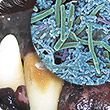
貓和狗的牙垢...
...一個可惡的問題
牙垢的形成是一個漸進的過程,而且幾乎所有的貓和狗在牠們的生命階段中皆會受其影響。 牙垢可導致痛苦的牙肉感染和牙周炎,以及在最壞的情況下,牙齒脫落和牙槽骨吸收 (resporption)。
牙垢是指牙齒上黃至褐色、不能通過洗刷清除的沉積物。 牙垢是通過唾液中的礦物鹽與牙菌斑混合而漸漸形成的。

牙菌斑是由唾液、食物殘餘、細菌及其代謝物結合累積而成的軟沉積物。(1) 最終,唾液中的礦物鹽導致這些沉積物硬化(2)(3) 牙垢本身不會導致感染的,但在其粗糙表面活動的細菌卻會(4) 細菌代謝過程的產品,其中包括酸,會攻擊牙齒和牙齦。 在貓,狗,圍繞唾液腺的排泄管道區域特別容易受到牙垢影響 - 這正是在上顎門齒的外面及下顎門齒的後面。
牙垢形成的多寡取決於各種因素諸如唾液的多少,牙齒之間空間的大小和口腔中細菌群的組合。 遺傳性有口腔問題的動物應特別注意這問題。
沒有牙菌斑,沒有牙垢!
牙垢引起的其中一個後果是牙周炎,細菌感染可導致口腔中無法補求的損壞。 如果不及時進行恰當治療, 最後唯一的選擇是由獸醫用機械器材去除牙垢,這步驟通常需要在全身麻醉下進行。在最壞的情況下,獸醫必須拔掉整顆牙齒。 但是,全身麻醉對於年長和有其他病況的動物往往是一個有風險的程序。
在達到這個階段之前,你應該嘗試給貓狗使用 OCC
幸好有 OCC...
... 你的寵物可避免全身麻醉的洗牙手術。 所有的麻醉劑都會對身體構成相當大的壓力。
牙垢及其後果
牙垢可引致非常痛楚的牙肉感染。牙肉感染可以損壞顎骨和導致牙齒脫落。


